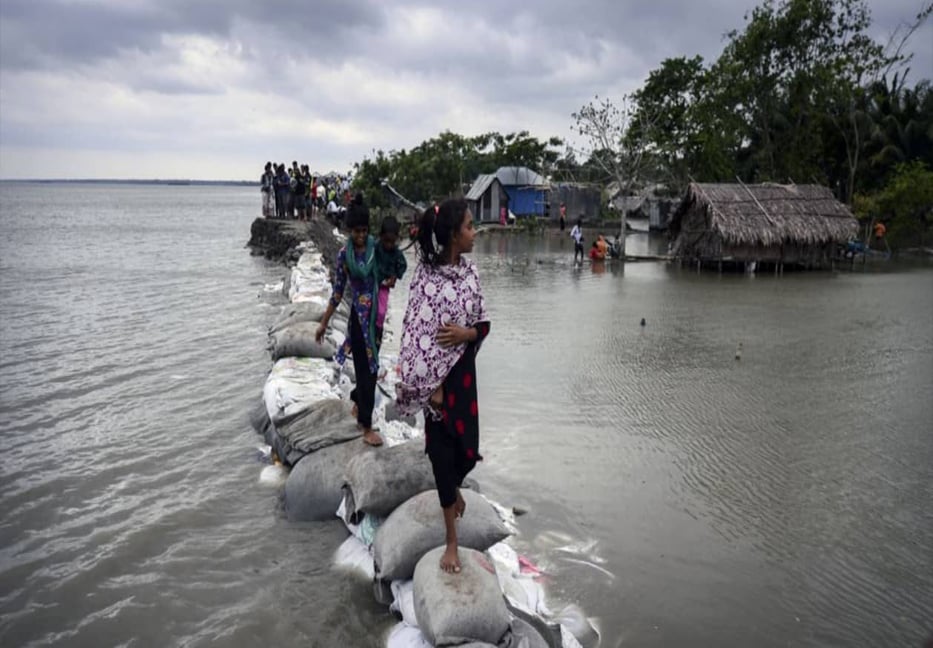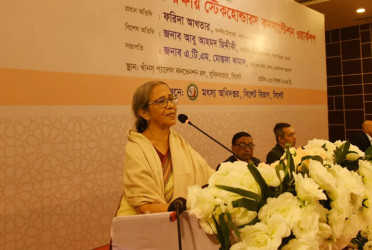The international organizations working on climate issues have marked Bangladesh as the 7th most vulnerable country prone to adverse effects of climate change. All of the 64 districts of the country are in the danger of facing adverse effects of climate change. The natural calamities are being seen more frequently in the country than ever before. The people living in the coastal areas have been migrating to towns, who lost their lands and homes due to adverse effects of nearby sea or rivers. So, due to excessive pressure of excess people, the cities are turning into ‘Heat Island.’ The risk to be climate vulnerable has increased to the areas like Varendra, Cittagong Hill Tracts and marshlands (haor).
According to various information analyzed, the loss of life and properties due to natural calamities are increasing day by day. As the sea-level and frequency of cyclones were increased, many people are losing their lands and houses. From 2014 to 2020, in 58 districts, 1,053 people have lost their lives and about 94 lakhs of them have been displaced from their lands.
The above information were revealed in the study of Start Fund Bangladesh, a network of 45 NGO’s operating in the country. The study was based on the analysis of recent most violent natural calamities. Due to climate change, four regions of Bangladesh are most prone to be vulnerable. These are: Varendra, Chittagong Hill Tracts, Coastal and Marshland (haor) regions. As the district, the most vulnerable ones are western part of Mymensingh, eaters part of Rangpur and southern part of Khulna.
The city is turning into a 'Heat Island': This year, the beginning of the monsoon did not see sufficient rainfall. The temperature was also high. Before this, severe heat waves swept across the country including the capital Dhaka. July is supposed to be full of monsoons, but this July the rainfall was not like that. This situation is not only in Bangladesh, July has been recorded as the hottest day in the world so far. This is the first time that the average temperature of the world has exceeded 17 degree Celsius. On July 6, the average temperature of the world was 17.08 degrees Celsius. Experts think global warming and climate change are behind for this condition. These are responsible for the warming in Bangladesh due to the excessive emission of greenhouse gases from neighboring countries. They also fear that the country's average summer temperature may increase by 3 to 4 degrees Celsius in the next 30 years if proper steps are not taken to prevent climate change and global warming. The maximum temperature of the year can reach up to 46 degrees. According to the Center for Environmental and Geographic Information (CEGIS), a government research institute, the country's average temperature rose by 0.0067 degrees Celsius every year from 1961 to 1990. Between 1991 and 2000, the temperature increased by 0.39 degrees Celsius. Between 2001 and 2010, it increased by an average of 0.53 degrees Celsius and between 2011 and 2019, it increased by an average of 1.06 degrees Celsius.
Under the initiative of Curtin University of Australia, University of Calgary of Canada and six researchers from Bangladesh, research conducted in cities like Dhaka, Chittagong, Rajshahi, Khulna and Sylhet which discovered that while the global temperature rise is below one and a half degrees Celsius, Dhaka's temperature has increased by about 3 degrees Celsius in the last 20 years. According to the study, other cities including Dhaka are turning into 'Heat Islands.’ Although the temperature around it is low, the island remains hot day and night. Due to climate change, people are moving to cities from coastal and flood-prone areas of Bangladesh. As a result, the temperature of cities like Dhaka and Chittagong is increasing and it is becoming a heat island.
Professor Dr. Md. Zillur Rahman, chairman of Department of Disaster Science and Management of Dhaka University told The Bangladesh Pratidin, 'When we see the temperature increasing for a long time, then we have to assume that it has been occured due to climate change. Normally, the temperature does not rise above 25 degrees Celsius in Vancouver, Canada. But recently we have seen the temperature rise up to 48 degree Celsius during summer. Climate change is responsible for the heat wave that is sweeping the country this time. Along with this, human-made factors like cutting more trees, river encroachment are also responsible.”
Concerns about cyclones: Concerns about cyclones are also being created among various natural disasters. There is a fear of more than one cyclone hitting the country in the coming years. Meteorologists believe that climate change, to some extent, is responsible for this. Analyzing the data of cyclones that have passed over Bangladesh in the past decade, it can be seen that a cyclone has hit Bangladesh every year from 2013 to October 2022 (except 2018). In 2021, there were three cyclones. According to a report titled 'Country Climate and Development' of the World Bank, the country is losing about one billion dollars annually due to cyclones. As the number of cyclones increases, this damage might be escalated. Former Director of Bangladesh Meteorological Department, Samarendra Karmakar, told The Bangladesh Pratidin that sometimes climate change could cause cyclones. In this case, the tendency of cyclones is expected to increase.
Rising sea level: Shahab Uddin, the Minister of Forests, Environment and Climate Change has expressed fear that by the end of this century, due to the rise in sea level, from 12.34 to 17.95 percent of the country's coastal area might be submerged in sea water. According to the research results of the project under implementation funded by Bangladesh Climate Change Trust Fund, the rate of sea level rise in the coastal area of Bangladesh is about 3.8 to 5.8 percent per year in the last 30 years.
International expert on climate change, Atiq Rahman said, “Some events of climate change are going beyond people's scope of becoming habituated to it. Climate change refers to the extreme state of the climate as a whole. People are not so used to the conditions when the climate becomes extreme especially when the temperature rises or falls too much, there is excess humidity. And when people can’t keep pace with it, it not only affect physically but also mentally.
@The report was published in Bengali on print and online versions of The Bangladesh Pratidin on August 6 and rewritten in English by Lutful Hoque



































































